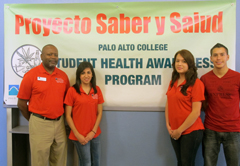The Pulse Archives
Healthy steps for a balanced life
By Syed Tawseef Ali | Pulse Staff Reporter

From Left, Mako Ivory, Priscilla Flores, Britany Lopez, Brandon Gonzales.
College can be stressful with all of the academic and personal responsibilities students have.
Pursuing a higher education takes away from family, friends, enjoyment and comfort. Even the most dedicated student can get caught up in coursework and chores, and end up paying with his/her health. Students should consider four important areas that will help them work toward a healthy future.
Meal Planning: Eating out is expensive, and cooking takes time. The cost of individual servings decrease as the quantity prepared increases; it is a lot more economical to prepare dinner for four rather than one person.
Francisco Hernandez, a sophomore Kinesiology major, is aware that it takes a greater effort to cook for one. He has influenced his family to eat out less. Now Hernandez and his family enjoy saving on meals together, as well as enjoying a healthy diet.
If cooking is not your thing, try learning simple dishes. Hernandez suggests a broiled chicken breast with canola oil, seasoning, and steamed vegetables.
“It is healthy and delicious,” said Hernandez. “It only takes a few minutes to prepare.”
It is also a good idea to prepare meals ahead of time and freeze them for busier times during the week.
Physical activity: Try to walk longer distances in between classes or ride a bicycle. Choose to walk instead of drive. Take the stairs over the elevator. Play with your pet more often, or take them for a walk. The Palo Alto College’s Fit Walking Program includes community members along with students. There are two trails and two separate walking groups on campus that meet everyday in the Palo Alto College courtyard from noon to one.
PAC also offers various classes such as kettle Bells, yoga, kickboxing and strength training along with recreational sports, a cardio room and a weight room for all students, staff and faculty.
Alexis Lowe, a Kinesiology assistant professor and program adviser, said, “Take the stairs when you can.”
Lowe believes health affects all aspects of our lives. Exercise leads to more oxygen in the brain. It helps with mood and emotions, and it “de-stresses you.”
Routine checkups: PAC’s Student Health Awareness Program recommends CentroMed Palo Alto Clinic on the Poteet Jourdanton Highway 16. Students can walk in and see a nurse, and if required, a doctor, within a short period of time. PAC’s Student Health Awareness Program, located at the Student Center, Room 115, is dedicated to providing information and resources to promote student health. The program’s focus includes, but is not, limited to sexually transmitted diseases (STDs), unplanned pregnancy and substance abuse.
Nicotine and alcohol intake: if you already have a smoking or drinking habit, try to reduce your consumption. This can also help you when you try to quit. Mako Ivory, a peer educator at the PAC Student Health Awareness Program, said that there are similar trends within all ethnic groups as studied by the San Antonio Metropolitan Health Services Administration. Large numbers of 18 - to 24-year-old college students discontinue school because of health issues. These health focuses, which are recorded above, are intertwined with one another, and ultimately prevent students from succeeding with their personal goals.
Ruby Barron, another peer educator at the Student Health Awareness program, said their goal is “to inform the students, so that they can make better decisions regarding their health and well-being.”
Our health is our responsibility. Starting to care for it today will bring positive results tomorrow.
March 2012
- Father, mother, sister, brother attend Palo Alto
- Palo Alto recognizes teaching excellence
- Construction projects receive mixed feedback
- SOPA and PIPA remain mysteries for most
- Student veterans organization provides support
- Bikeshare program cruises into Palo Alto
- Another green year at Palo Alto
- To e-book or not to e-book?
- Palo Alto, the college for you
- Ten tips for successful learning
- Healthy steps for a balanced life
- How to write a resume the right way
- Why graduate and not just transfer?
- Sweet Anticipation: Spring Break 2012